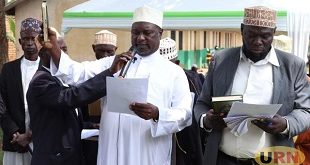
Kampala, Uganda | THE INDEPENDENT | Seventeen percent of women in the country think gender equality is not practical and that men are more knowledgeable than women, a new baseline survey to assess access to equality by women has revealed.
Funded by the Kingdom of Netherlands, the survey was conducted by the Avocats Sans Frontieres-ASF in partnership with Uganda Women’s Network-UWONET in eight districts from Busoga, Karamoja, Bunyoro, and Acholi sub-region under the theme, “From Access to Equality, Empowering Women to Access Justice in Uganda.”
The lead researcher Ismail Ochen, says that they conducted semi-structured interviews and focused group discussions with 401 women from eight districts of Masindi, Napak, Kamuli, Gulu, Soroti, Moroto, Hoima, and Lamwo.
The women were asked whether they believed that women and men were treated equally by society. They were also asked if they enjoyed their rights including social and economic rights and the ease with which they receive help when their rights have been violated.
Ochen says that 17 percent of women revealed that they do not have equal rights as men and that men are more knowledgeable than women. Another 16 percent said that women have access to all the rights that men have and that their values are valued in households while 76 percent said women are not as valued as men and that men “believed women to be the weaker sex.”
The survey also indicated that 68 percent of the participants were either victims of gender-based violence or knew a person whose rights were violated. The women reported different forms of abuse including physical violence, disputes with family, neighbors, and friends, sexual violence, and economic violence among others.
It was further noted that gender-based violence and land rights violence dominated the gender-based violence cases. The main perpetrators of gender-based violence, as has been, were husbands or partners who constituted 87 percent of the abusers as reported by the women, family members with 6 percent, women 3 percent, and youth constituted 2 percent of the perpetrators.
The research indicates that the biggest justice need for women is economic justice. By this, they mean violence meted out to women because they are less financially stable and dependent on men. Ochen noted that women are often beaten by their husbands or partners for asking for money for food, school fees for children, and sanitary products.
The survey also assessed perceptions of women regarding access to land. Findings indicate that 92 percent of women said they were aware of their rights to own land but only 60 percent were able to actually have access to the land.
The abuse of land rights was dominant in Lamwo where all participants were denied access to land. In Gulu, 28 percent of the women had access, in Moroto 33 percent while Kamuli had the highest number at 65 percent. The reason for denied access to land was said to be cultural practices that bar women from owning land coupled with ignorance of women about their land rights.
“It was mentioned that because of this lack of knowledge, some women are tricked to silence them on issues regarding land so that they do not challenge decisions made,” reads the report in part. The lead researcher Ochen says that the participants also revealed that the highest form of injustice regarded economic rights.
State Minister for Gender, Labour and Social development Peace Mutuuzo, says that the government has put in place different laws to protect the rights of women but unfortunately the vice continues. She’s particularly dismayed by the duty bearers who don’t promote gender rights and sometimes turn out to be the abusers.
During the two years of COVID 19 lockdown that saw schools closed, over 2 million girls majority of whom were aged 10 to 15 years were impregnated, and sometimes by family members including their fathers. Cases of defilement have also been reported in schools, where teachers who should protect these children turn to using them to satisfy their sexual pleasure.
Mutuuzo also accused some members of the police of contributing to the problem by declining to attend to women who come to report gender-based violence cases, especially those regarding sexual activity or physical abuse.
Mutuuzo also appealed to the judiciary to expedite gender-based violence cases and make the process friendly for the victims. According to the 2021 Police Crime Report, 17,533 cases of domestic violence were reported with a total of 12,877 women and 702 girls as victims. A total of 1,486 rape cases and sexual-related offenses constituted crimes reported with defilement making 6,191 cases that were taken to court.
However, the police report indicates that 939 defilement cases reached the conviction stage, 24 were acquitted, 174 were dismissed, and 5,054 are still pending in court while 5,009 cases are still under investigation. Mutuuzo says the judiciary should expedite the cases because justice delayed is justice denied.
Mutuuzo further asked women to demand for their rights because they shall not be given to them on a silver platter. She wants women to stand up for themselves, report and ensure that their perpetrators face the law, and work hard to become independent.
Brenda Ataro, the Program Coordinator of Avocats Sans Frontieres-ASF says that the study shall inform the interventions that the Organization and its partners UWONET shall formulate to increase access to justice for women. She says that they want to find interventions that fit the needs of girls, older women, and people with disabilities, teenage mothers among others.
*****
URN
 The Independent Uganda: You get the Truth we Pay the Price
The Independent Uganda: You get the Truth we Pay the Price



